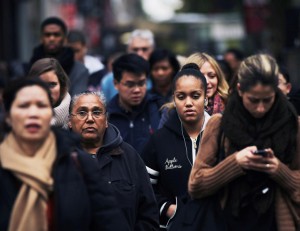 As we covered in last month’s article on microaggressions, they are often subtle, racial insults by well-intentioned people. And they’re experienced by people of color on a regular, sometimes daily, basis. One study found that 96% of African-Americans reported that they experienced microaggressions within the previous year.
As we covered in last month’s article on microaggressions, they are often subtle, racial insults by well-intentioned people. And they’re experienced by people of color on a regular, sometimes daily, basis. One study found that 96% of African-Americans reported that they experienced microaggressions within the previous year.
Some of the most common microaggressions that racial minorities experience are:
- When shopping or dining, the assumption that they are service workers rather than customers.
- The assumption that minorities are likely thieves and thus are followed around retail stores. A black woman shared that this happens to her “at least once a week at places where I am receiving some kind of service.”
- Critical and offensive comments, stated as fact, on how minorities talk, dress, or style their hair. For example: comments that a person is “too loud” or “speaks so well,” as though it is unexpected from someone of their culture.
- Not understanding racial and cultural differences and assuming that racial minorities are the same ethnicity. For example, when my Japanese friend moved to Chinatown, people constantly asked her if she felt “at home.” She’s not Chinese. It’s not the same.
- Assuming that all Latinos speak Spanish. No other ethnic group in the United States is expected to be bilingual.
- Asking, “What are you?” when unable to identify his or her racial or ethnic background.
While there are individual instances of microaggressions, there are also environmental ones. These are microaggressions that occur and are supported on a larger, societal scale:
- The Oscars is a perfect example of the environmental aspects of microaggression. An all-white actor/actress nominee selection for the Academy Awards ceremony sends the message that white is the standard and the only important perspective or influence there is.
- The constant bombardment of feisty, neck-rolling black women in media as a standard and accepted representation of black women.
- Questioning and challenging the need for minority spaces within larger organizations that are dominated by the majority. For example, when I was planning a meeting for social workers of color (in a predominantly white organization), I heard the comment, “This offensive. This is wrong.”
- Finally, the denial by people in the majority of racial experiences is a cornerstone of microaggressions.
What can be done about it? A multipronged approach is needed. First, people inflicting the pain need to stop. As in any relationship, when someone is hurt, the person who caused the hurt needs to stop the painful action, apologize, and commit to not repeating it.
Of course, this is easier said than done. Change is a long process, just like in relationships. Mistakes will be made, and painful interactions will continue to occur. But making a commitment not to engage in microaggressions is a useful start.
Here are some concrete steps and important considerations:
Stop and Think Before Speaking
How will your comment be received? Does the setting make a difference? Is it something you should say to another person?
I recently had a white friend ask me about commenting on a black woman’s hair. She knew that hair was an important and sensitive topic in the black community, and she wanted to be respectful in complimenting this woman’s hair. We talked it through and discussed what she wanted to say, why she wanted to say it, and her relationship with the woman. It seemed “safe” to compliment the woman’s hair.
Context Matters
And then I asked about the environment. Where would they be and who else would be present? Those factors can have a big impact; in this case, it changed my perspective. Suddenly a compliment no longer was “safe” and felt different when singled out to one black woman in a room of white women.
For the record, when my friend approached me to ask her question and have this discussion, she prefaced it by saying she wanted to ask me something related to race and understood if I didn’t want to have the conversation with her. She didn’t act on her privilege and assume that she could ask me anything because she’s white and I’m black. This is very different than when people approach minorities and ask them questions about race assuming that they will represent their entire race—another form of microaggression.
For those of us on the receiving end of microaggressions, we need to acknowledge its impact on us. Constant exposure to microaggressions has a significant toll on the physical and mental health of racial minorities. Research demonstrates that the cumulative effects of microaggressions are devastating. They can lead to feelings of isolation, self-doubt, and frustration.
Recognize It for What It Is
We need to acknowledge a microaggression for what it is. To ignore or dismiss it allows it to fester within us, causing harm to who we are as people. This isn’t to say it should be at the forefront of our minds each day, or that you need to confront everything you experience. But it does mean that you need to be aware that this happens and has an effect. Then you can prepare to deal with it.
Awareness Is Key
There are some situations and environments where you may experience microaggressions more frequently. If you are in an environment where you are the “only,” this may be one of those situations. Be aware of this so you can prepare for those times.
Do a Self-Inventory
The hardest part of dealing with microaggressions is that they are easily deniable.
I just like your hairstyle. What’s the big deal?
OK, so you don’t speak Spanish. It was an honest mistake. Don’t overreact!
These are common responses when calling out microaggressions. When you experience a microaggression, there’s something inside you telling you that you’ve been hurt. Perhaps you get a knot in your stomach, flashes of warmth, an instant headache, or a voice saying, “That’s not right.” Often there is some physical experience that acts as a red flag for you. Pay attention to it.
Seek Support
Have someone in your corner who sees and understands microaggressions. You need someone you can talk to and explain what happened, your feelings, and to do some reality testing with. Because the offender and bystanders will likely deny and even become defensive about microaggressions, you need someone you can talk to without defending your experience.
If you don’t feel comfortable talking to someone in your life, seeking the guidance of a qualified therapist can help you sort through your feelings about your experiences.
Let It Out
Don’t let the self-doubt, anger, or frustration eat away at you or cause you more harm. Whether it’s walking, talking, screaming, crying, or running, find a way to let the pain out. After you’ve done this, you’ll be able to think clearly and decide on your next plan of action.
To Confront or Not Confront?
There are pros and cons to this, particularly in work settings, often placing us in a catch-22. Each circumstance and each person is different. What you need in your life changes with time and environment. Be compassionate and flexible with yourself as you make the decision to confront or not confront a microaggression.
The societal and environmental aspects of microaggressions need to change. Though it may seem overwhelming trying to change centuries-long systems of oppression, “never doubt that a small group of thoughtful, committed citizens can change the world; indeed, it’s the only thing that ever has” (Margaret Mead).
References:
- Klonoff, E. A., & Landrine, H. (1999). Cross-validation of the schedule of racist events. Journal of Black Psychology, 25, pp. 231-254.
- Pierce, C., Carew, J., Pierce-Gonzalez, D., & Willis, D. (1978). An experiment in racism: TV commercials. In C. Pierce (Ed.), Television and education, 62-88. Beverly Hills, CA: Sage.
- Steele, C. M., Spencer, S. J., & Aronson, J. (2002). Contending with group image: The psychology of stereotype and social identity threat. In M. Zanna (Ed.), Advances in experimental social psychology, 23, pp. 379-440. New York: Academic Press.
- Sue, D. W., Capodilupo, C. M., Torino, G. C., Bucceri, J. M., Holder, A. M. B., Nadal, K. L., & Esquilin, M. (2007). Racial microaggressions in everyday life: Implications for clinical practice, American Psychologist, 62(4), pp. 271-286.

The preceding article was solely written by the author named above. Any views and opinions expressed are not necessarily shared by GoodTherapy.org. Questions or concerns about the preceding article can be directed to the author or posted as a comment below.

 When You’re a Minority in a Majority World
When You’re a Minority in a Majority World Fitting In, Standing Out: Bigotry in the LGBT Community
Fitting In, Standing Out: Bigotry in the LGBT Community 'The Content of Their Character': Remembering Dr. King's Words
'The Content of Their Character': Remembering Dr. King's Words

